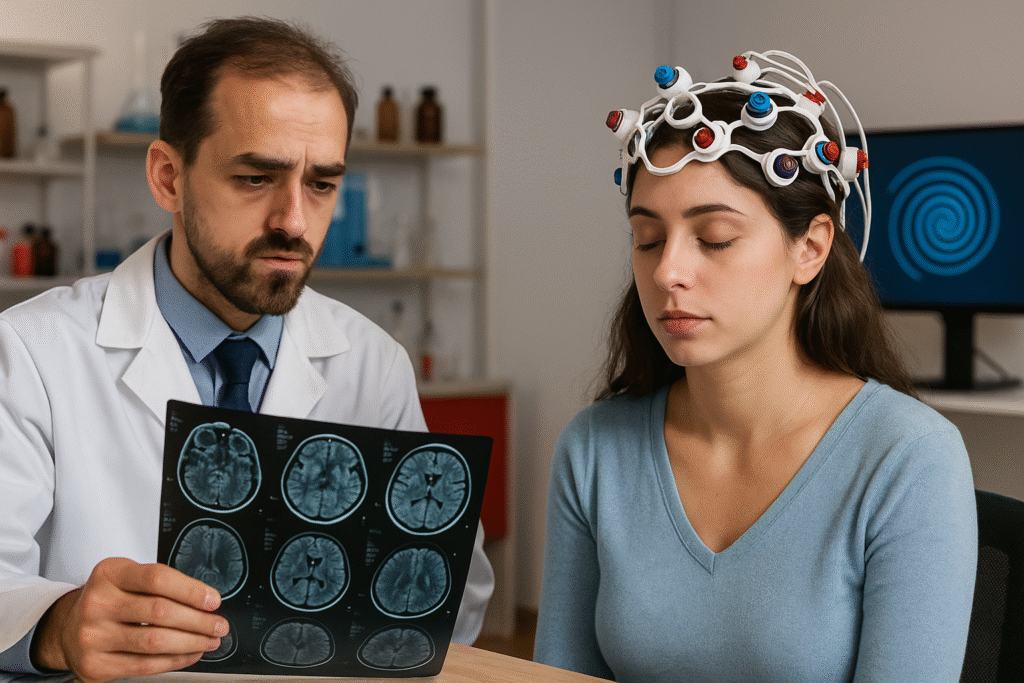Hello, this is Amber with your weekly installment of Hypnosis News. Last time we covered a lot neuroscience in relation to hypnosis research. Today I want to talk about where the research is headed and what we may see in the near future. As amazing as it is to see how our brain works, it can be even more amazing to imagine where the research is heading. If you didn’t catch part one of this set of posts, click here.
In addition, we’ll talk about some of the struggles researchers are having conducting hypnotic research. Which is important when attempting to understand the results, outcomes, and accuracy of an article. Without understanding the pitfalls and barriers to productive research, we can miss important distinctions in the articles we are reading.
The article this post was inspired by, made me realize how limiting the past body of research may be to real results. For example, limiting a study to one type of hypnotic induction or deepener, or a particular suggestion, means that each person’s brain could interpret each of those pieces differently. Leading to a variety of results.
In contrast, take a study where the goal is just to get someone into trance and achieve a particular goal. A hypnotist using a wider variety of tools, likely would achieve more consistent and successful results. The first study only studies the effect of one suggestion where each individual in the study may required different things based on their background, history, and specific symptoms to solve the problem being studied. These variables and issues make research very hard.
SO lets take a look at where the research may be going. As well as some of the barriers it faces in the future.
Using hypnosis to model psychiatric symptoms
So one of the things we may see in the future of hypnotic research and use regards psychiatric modeling of symptoms. Hypnosis has been shown to be capable of producing amnesia, delusions, and visual hallucinations, among other phenomena over the years. Those things may sound scary, but really they are fairly common acts in stage shows. Neurologist and psychologist are hoping that we can use these to model the symptoms so that we can study them in controlled settings using brain scans.
Just imagine what we could learn studying symptoms of depression, anxiety, stress, addiction, among others. There is so much we could learn about brain functioning during these states as well as how to combat their effects. It could lead to breakthroughs in both chemical and intervention based treatment approaches. As is often the case with science, the possibilities are endless.
In fact, researchers are interested in learning a lot more about hypnotic suggestions and how they might be used to study particular symptoms. The research so far indicates that there is a lot of overlap between the hypnotically induced versions of these symptoms and those that we see in brain scans of people who consistently suffer from them. There may even be indications that further research into even the differences between these states could be of benefit to developing future treatments.
Current Challenges in Hypnosis Research
Despite a wide range of advances in hypnotic research, there has also been a sense that hypnosis, as a field has lost some of the momentum it gained in the early 1990s. Part of this may be due to a loss of prominent researchers. This may have led to less funds being allocated to their departments as they retired. This has caused the pursuit to be largely individual and has caused several rifts and disagreements on common problems and how to recognize research progress.
Taboo Research
In addition the field faces another major problem. There are many in the broader scientific community that sees hypnotic research as taboo or unscientific. Unfounded perceptions driven by inaccurate portrayals only lead to a failure to consider real facts and data.
Such perceptions have a number of negative consequences on the field. Including a decline in funding for research. Some believe this may be due to the field’s association with stage hypnosis, the aforementioned inaccurate portrayals in media, and past controversies involving hypnosis and memory.
The good news is that the perception of hypnosis may be shifting. The National Institute of Complementary and Integrative Health at the National Institutes of Health in the USA now recognizes hypnosis as a topic of interest. And they have started to fund large scale studies regarding the efficacy and mechanisms of hypnosis treatments. In addition, more and more papers on hypnosis are being found in higher impact journals.
Lack of Organization
Many individuals are doing hypnosis research. One major problem remains. As a whole, the researchers are not very organized. There is a huge lack of ongoing collaboration and exchange between those doing the research. In addition, these individual researchers are targeting different features of hypnosis rather than asking a coherent set of core questions. This limits the impact of each research program while leaving differences in finding unresolved. It also leads to a lack of comprehensive theories in general. This lack of development results in an impediment to our continued scientific understanding of hypnosis. Or its wider application to human cognition and function.
Suggestions Anyone?
So what do we do to address these ongoing challenges? What suggestions and changes may we see? That’s what we’ll discuss next week in part 3 of Neuroscience and Hypnosis.



